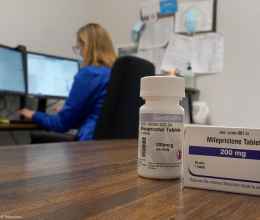
The doctor-patient relationship is the cornerstone of medical practice, and the foundation of that relationship is trust. Doctors have the privilege of helping people through some of the most important and challenging moments of their lives. We earn patients’ trust by giving them our best medical judgment based on science. That’s why I became a doctor.
Now, as I enter my third year of medical school at the University of Texas Southwestern, I am beginning to understand all the ways Texas politicians are working to corrode this trust by interfering in the doctor-patient relationship.
In 2003, the Texas legislature passed a law that mandates every woman who seeks an abortion must be provided a booklet with the Orwellian title "A Woman’s Right to Know." The booklet has long contained biased and intentionally misleading and inaccurate information about abortion, including the debunked claim that abortion is linked to breast cancer, infertility and suicide. In 2013, Professor Cynthia Daniels and her research team recruited a team of seven specialists in embryological and fetal development through the American Association of Anatomists to evaluate these materials. They found that 48.72% of the booklet’s statements concerning the first trimester are medically inaccurate. At that rate, if you were reading "A Woman’s Right to Know" for factual information, you may not pass your reproductive health exam in medical school.
Now, just weeks after the U.S. Supreme Court struck down Texas’s medically unnecessary abortion restrictions—also known as HB2—Texas officials are thinking up new ways to endanger the trust between doctors and patients and promote their anti-choice agenda. The Texas Department of State Health Services is revising the "A Woman’s Right to Know" booklet by adding more scientifically inaccurate information about embryologic and gestational development, including the assertion that fetuses feel pain before 20 weeks—a favorite contention of abortion opponents that finds no support in peer-reviewed medical literature. Texas women deserve medically accurate information and doctors deserve the ability to provide care to their patients based on their best medical judgment and the most current research.
I’ve worked hard in medical school and want to give my patients the best care informed by my education, training and judgment. The Texas officials responsible for the booklet’s misinformation are clearly not informed about current research and best practices in women’s health. About half of American women will have an unintended pregnancy, and 3 in 10 women will have an abortion in her lifetime. Abortion is one of the safest medical procedures. And many experts throughout the country and around the world have worked to develop the evidence that informs our current models of abortion care and family planning. These models do not include the medical inaccuracies found in the State’s "A Woman’s Right to Know booklet". Quality, peer-reviewed information is what should be disseminated to our patients rather than politically charged and biased pseudo-science.
Leslie Johnson is a medical student at UT Southwestern Medical School and president of her school’s Medical Students for Choice chapter. She lives in Dallas, Texas.
The public comment period for the "Woman's Right to Know" booklet ends July 29. Tell Texas legislators to stop lying to women seeking abortion care.





